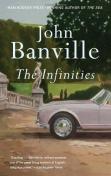BKMT READING GUIDES
The Infinities
by John Banville
Paperback : 288 pages
1 club reading this now
0 members have read this book
On a languid midsummer’s day in the countryside, the Godley family gathers at the bedside of Adam, a renowned mathematician and their patriarch. But they are not alone in their vigil. Around them hovers a clan of mischievous immortals—Zeus, Pan, and Hermes among them —who begin to ...
Introduction
On a languid midsummer’s day in the countryside, the Godley family gathers at the bedside of Adam, a renowned mathematician and their patriarch. But they are not alone in their vigil. Around them hovers a clan of mischievous immortals—Zeus, Pan, and Hermes among them —who begin to stir up trouble for the Godleys, to sometimes wildly unintended effect. The Infinities—John Banville’s first novel since his Booker Prize-winning and bestselling The Sea—is at once a gloriously earthy romp and a wise look at the terrible, wonderful plight of being human.
Editorial Review
A Q&A with Author John Banville
Question: Where did you get the idea to use Greek gods as characters in a novel? And then how did you settle on the ones we meet in The Infinities?
John Banville: I have always been an admirer of the great German dramatist Heinrich von Kleist, particularly the play I consider his masterpiece, Amphitryon, which I adapted for the Irish stage. In this wonderful tragi-comedy Jupiter falls for Alcmene, wife of the Theban general Amphitryon, and comes to earth with his son and sidekick Mercury, to spend a heavenly night with the lady; the next morning Amphitryon returns unexpectedly from the wars, precipitating an intricate comedy of errors. Originally I intended to base The Infinities quite closely on Amphitryon, but fiction has its own laws and its own demands, and the finished novel is an autonymous creature, though the Kleist is still there in skeletal form.
Question: Why did you decide to make Adam Godley a mathematician?
John Banville: I donâ??t know that I ever actively decided to make him anything."Decisions" in the writing of fiction tend to be mostly a matter of dream and drift. But I wanted him to be someone operating in an otherworld of speculation, pure number, and infinitudes, where the gods might be already at play.
Question: There is something so classical and familiar about the death bed scene, the family patriarch dying and the family coming from far and wide to gather at his bedside. What about the death bed construct appealed to you as a starting off point?
John Banville: Again, I didnâ??t think of the book as centering on a death bed scene--and I donâ??t think it does, really--but of course fiction is a tired old business where there is nothing new under even the intensest sun. In fact, one of the pleasures of working in the novel form is the challenge of finding new ways to present old things. Spinoza says somewhere that the wise man thinks only of death but all his thoughts will thereby be a contemplation of life. I hope thatâ??s the case with The Infinities, and that everything in it is vividly alive, even the dying old man upstairs.
Question: Many readers have commented on the humor in this novel. Is it harder for you to write comedy or tragedy (which you have certainly done in previous novels)?
John Banville: All my books are funny, if you know how to listen for the jokes. The novel, at a certain basic level, is a comic form. Do you know the story of Kafka reading to a group of friends from The Trial, and laughing so much he could not get past the first page? Kafka is a great realist--indeed, one of the greatest--and reality is always funny, though the fun is often steeped in pathos.
Question: This novel takes place over the course of a single day. Why did you decide on that time structure?
John Banville: I was following Amphitryon in this--preserving the unities, as the Aristotelians say. There is a nice compactness to the time-scale in the book, which I like. Also the fact of limiting the action to a single day makes for a mysterious sweet melancholy. Everyone has days that will live in the memory for a lifetime; for my characters, that Midsummer Day is one.
Question: So Hermes is our narrator (though, of course, John Banville is really our narrator). So author as messenger? Author as God? Or is that just reading too much into it?
John Banville: Well, of course, in the little world of a novel the author is a god, or at least a demigod, watching over his creatures, helping them, if he can, or at least not hindering them. In a wider sense, I find the pagan world of the Greeks highly appealing, and wish we could regain their state of innocence and sophistication. Bring back the old gods, I say.
(Photo © Jerry Bauer)
Discussion Questions
No discussion questions at this time.Book Club Recommendations
Recommended to book clubs by 0 of 0 members.
Book Club HQ to over 90,000+ book clubs and ready to welcome yours.
Get free weekly updates on top club picks, book giveaways, author events and more








